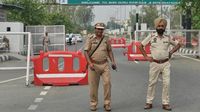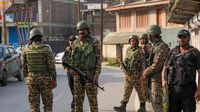In a dramatic escalation of tensions between India and Pakistan, Indian airlines have suspended flight operations from over two dozen airports across northern and western regions of the country. This decision follows India's military action against alleged terrorist camps in Pakistan, prompting widespread cancellations and heightened security measures.
The Civil Aviation Ministry in India has not officially commented on the airport closures, but domestic airlines have taken significant steps to manage the fallout. Indigo, the country's largest domestic carrier, canceled 165 flights on Wednesday, May 7, 2025, with Air India and Air India Express reporting similar numbers. The cancellations have left passengers stranded and frustrated, with many having to deal with unexpected travel disruptions.
Rahul, a 32-year-old businessman, experienced this firsthand when his flight from Dubai to Chandigarh was canceled due to the sudden closure of the Indian airport. "It's a security situation. I understand," he remarked, reflecting the sentiment of many travelers caught in the chaos.
The backdrop to these cancellations is stark. On May 7, India launched missile strikes targeting what it described as terror training camps in Pakistan, a response to the massacre of 26 Indian tourists in the Pahalgam region of Jammu and Kashmir on April 22. India accuses Pakistan of harboring the gunmen responsible for the attack, an assertion that Islamabad vehemently denies.
As tensions escalated, Pakistan retaliated with drone attacks on Indian border states including Jammu, Punjab, and Rajasthan, prompting a nationwide high alert. In response, several airports have been shut down, including those in Chandigarh, Jammu, Srinagar, Leh, and various locations in Gujarat and Rajasthan. The ongoing conflict has led to the closure of 24 airports across India, affecting both domestic and international travel.
Flight operations at Srinagar's Sheikh-ul-Alam International Airport have come to a near-complete halt, with reports indicating a 45% drop in passenger numbers since the April 22 attack. The airport, which typically handles around 20,000 passengers daily, has struggled to resume normal operations since the May 7 strikes. Javed Anjum, the airport's director, stated, "The traffic has been hit badly after the terror attack. Now, things are at a standstill." Flights are expected to remain suspended until at least May 10, 2025.
In the wake of the heightened security situation, schools in several border districts of Punjab, Haryana, and Rajasthan have been closed, and blackouts have been enforced to protect critical infrastructure. The governments of these states have also canceled leave for police and health personnel, ensuring that emergency services remain fully operational. Chief Minister Nayab Singh Saini of Punjab has emphasized the need for readiness in the face of potential threats.
As the situation continues to unfold, the Indian Ministry of Defence has stated that military stations in Jammu, Pathankot, and Udhampur were targeted by Pakistani-origin drones and missiles, which were neutralized without casualties. The ministry assured the public that India remains prepared to defend its sovereignty.
Airlines across the country are advising passengers to arrive at airports at least three hours before their flights due to enhanced security measures. The Bureau of Civil Aviation Security (BCAS) has implemented stricter protocols, including secondary security checks at boarding gates and a ban on visitor access to terminal buildings.
Meanwhile, international airlines are also feeling the impact. United Airlines and Korean Air have rerouted flights to avoid Pakistani airspace, while American Airlines has adjusted its operations to accommodate the changing situation. The Association of Asia Pacific Airlines has expressed concerns about the risks of GPS spoofing, which could further complicate air travel in the region.
With the ongoing military operations and retaliatory actions, the ripple effects are being felt across various sectors, including tourism. Tour operators in Kashmir report significant cancellations as travelers opt to avoid the region amid safety concerns. Diksit Dolma, a hotelier in Leh, lamented, "We were looking forward to a good season, but now we are just scraping through. No flights, no tourists—it's disastrous for our business."
As of Friday, May 9, 2025, the situation remains tense, with 138 flights canceled at Delhi's Indira Gandhi International Airport alone. The airport has remained operational, but some flights have been affected due to airspace restrictions and heightened security measures.
In summary, the ongoing conflict between India and Pakistan has led to significant disruptions in air travel, with hundreds of flights canceled and airports closed across the country. As both nations navigate this precarious situation, the impact on civilians and the broader economy is becoming increasingly apparent.





